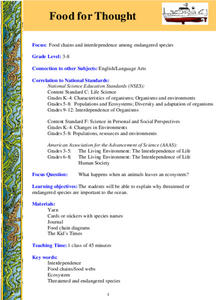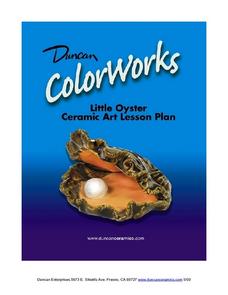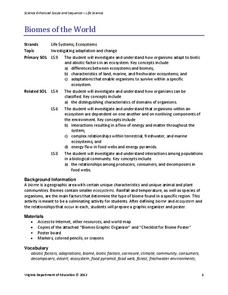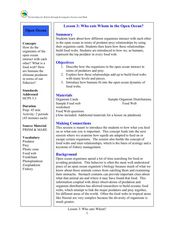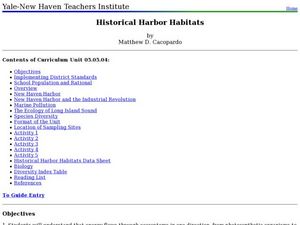Howard Hughes Medical Institute
Ocean Acidification
Human impacts on the environment can sometimes be difficult to measure, especially under water! An activity centered on ocean acidification gives science scholars the opportunity to examine the effects of carbon dioxide on marine life....
Polar Trec
Arctic Smorgasbord!
Two blooms of phytoplankton, instead of just one, now occur in the Arctic due to declining sea ice, which will have widespread effects on the marine life and climate. In small groups, participants build an Arctic food web with given...
Curated OER
Field Trip - Marine Science Institute
Students discover the ocean life of the San Francisco Bay. In this ocean lesson, students take a Discovery Voyage of the Bay ecosystem through the Marine Science Institute. Also available are inland voyages, ocean labs, and tidepool...
Curated OER
Investigating Ocean Life
Sixth graders explore the various forms of ocean life. They research a creature that lives in the ocean. Students use their research information to create a series of HyperStudio stacks about their sea creature.
Curated OER
9th Grade
Ninth graders discuss the principal source of energy entering the marine ecosystem. They name some of the autotrophs at the Maui Ocean Center. Students name some of the heterotrophs at Maui Ocean Center. They are taught that plants are...
Curated OER
Food for Thought
Young scholars explore the food chains in a variety of ecosystems and its relationship to the survival of threatened or endangered marine animals or fish in the ocean. The interdependence of the species is investigated in this lesson.
Curated OER
Little Oyster: Ceramic Lesson
Children will love researching and then creating a bottom dwelling mollusk of their own. They watch clips describing the ocean ecosystem and how oysters fit into their environment. Next, they research what oysters eat and how they look....
Curated OER
Ecosystems
A critical look into the structure and function of ecosystems is here for young learners as a series of lessons and worksheet activities. Topics covered include land-based and marine ecosystems, connections to the water cycle, food webs,...
Virginia Department of Education
Biomes of the World
Incorporate knowledge about biomes and ecosystems in multiple ways while encouraging creativity. Emerging ecologists collaborate and perform research to complete a graphic organizer about various biomes of the world. They conclude the...
American Museum of Natural History
Dive Into Worlds Within the Sea
Make connections between ocean organisms. Individuals explore three different ecosystems in the ocean. With an online interactive, they learn how different organisms depend upon each other. Learners first answer questions to connect...
Curated OER
2005 Hidden Ocean Expedition What's Eating You?
Analyze data and make inferences about the trophic position of organisms in the Canada marine food web. After a review of the geography and formula, discuss results and write an essay to improve the understanding of Artic food webs.
Curated OER
Jelly Critters
Students compare and contrast three different organisms that are considered gelatinous zooplankton. They describe how they fit into marine food webs.
Curated OER
Shark Food
Young scholars create a linking chain to demonstrate the food chain. In this food chain lesson, students use the Internet to research sharks, including what they eat, and create a chain link with a picture of a shark. They continue...
Curated OER
The Science Behind Dolphins
Students discover facts about marine mammals, specifically dolphins. In this K-2 lesson plan, students identify the different species of Cetaceans, focusing on dolphins. Students answer true/false questions regarding cetaceans and...
Curated OER
Sea Connections
Students, after locating different marine habitats on a globe, play a card game about ecosystems, food webs and organisms.
Curated OER
Who Eats Whom in the Open Ocean?
Students examine how organisms interact with one another in the ocean. For this science lesson, students discuss predators and prey in the ocean. Students discuss food webs and how organisms interact with each other.
Curated OER
Fish Are Animals Too
Students create posters that show how a shark is a major predator in kelp forests and coral reefs after studying the food webs for these ecosystems. They determine that fish are important animals in the ocean's web of life.
Curated OER
Sponges and Cnidarian Crossword Puzzle
In this marine science worksheet, students complete a crossword puzzle with 32 questions on sponges and cnidarian. They identify the different characteristics of sponges and cnidarian.
Curated OER
Blue Planet: Open Ocean
Students research facts about animal species. In this ocean activity students view a video, prepare illustrated cards and create a food-web display.
Curated OER
Oceans and Coasts
Students explore the topic of marine pollution. They define key vocabulary words, list examples of marine pollution, complete a true/false handout, read an article, and participate in a class discussion.
Curated OER
Empty Oceans
In groups of four, pupils brainstorm about seafood. They view the Monterey Bay Aquarium Seafood Watch website to examine the problems caused by the seafood industry. Learners are then brought back together to discuss what they...
Curated OER
The MPA “GamePlan”
Eighth graders explore the purpose of having Marine Protected Areas. In this environmental science instructional activity, 8th graders simulate the planning process by playing a board game. They explain the positive and negative effects...
Curated OER
Historical Harbor Habitats
Tenth graders create food web displays in the classroom. For this ecology lesson, 10th graders identify the different pollutants in the environment and their effect on organisms. They collect samples of sediments from the harbor and...
Curated OER
Seas Of Life
Students brainstorm examples of predator and prey that are featured in a video they watch. In this investigative lesson students will research an animal from the video and explain if it is a predator or prey and how it helps species...







